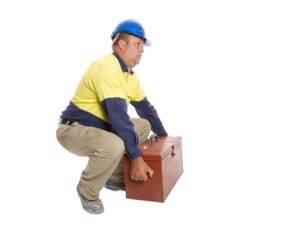You may be wondering ‘how can manual handling cause slip, trip and fall injuries?’. If so, this guide could help. It will explore what manual handling is and how you could sustain harm when carrying out manual handling activities in the workplace. We will also discuss the duty of care your employer owes you and how a breach of this could lead to you becoming injured at work.

Additionally, we will discuss when you could be eligible to begin a personal injury claim for injuries sustained at work as well as the time limits you have to do so and the evidence you could gather in support of your case.
This guide also features a compensation section that addresses what your settlement could consist of and how it might be calculated.
If you want more information on claiming for manual handling injuries, you can speak to one of our advisors for free. They may connect you to a No Win No Fee solicitor from our panel if they believe you have valid grounds to make a claim. To get in touch, you can:
- Call us on 0333 000 0729
- Contact us online
- Message us on our live chat below
Select A Section
- How Can Manual Handling Cause Slip, Trip And Fall Injuries?
- Who Could Claim For Manual Handling Slip, Trip And Fall Injuries?
- How To Prevent Manual Handling Slip, Trip And Fall Injuries At Work
- Examples Of Payouts For Manual Handling Slip, Trip And Fall Injuries
- No Win No Fee Workplace Manual Handling Slip And Fall Injury Claims
- Learn More About Slips, trips And Falls At Work
How Can Manual Handling Cause Slip, Trip And Fall Injuries?
Manual handling can involve the action of pulling, pushing, lifting, carrying or moving loads. In some cases, it can lead to slip, trip and fall injuries.
Slip, trip, fall workplace accidents when manual handling could be caused by poor environments, such as trip hazards being left unattended and spaces being untidy. Some examples include:
- Debris.
- Trailing wires or cables.
- Wet floor surfaces.
- Poor lighting.
- Restricted walkways.
According to the Health and Safety Executive (HSE) workplace injury statistics, slips, trips, and falls make up the largest percentage (30%) of non-fatal injuries and handling, lifting or carrying makes up the second largest (18%).
However, it is not always possible to make a claim for injuries sustained when manual handling or those caused by a slip, trip or fall in the workplace. You can find more information on the eligibility requirements for making a claim in the following section.
Who Could Claim For Manual Handling Slip, Trip And Fall Injuries?
In order to be eligible to begin a personal injury claim, you must be able to prove that your injuries were due to an employer’s negligence. This involves proving:
- Firstly, you were owed a duty of care by your employer at the time and date of the accident.
- Secondly, there was a breach of duty.
- Thirdly, this breach resulted in your injuries.
Employers owe their employees a duty of care as outlined in the Health and Safety at Work etc. Act 1974 (HASAWA). The act states that an employer must take reasonable steps to maintain a safe working environment and prevent employee injuries.
Furthermore, The Manual Handling Operations Regulations 1992 sets out the specific responsibilities employers have in relation to managing manual handling operations.
If your employer fails to uphold their duty of care and causes you to sustain harm as a result, you could be eligible to make a claim against them.
How Long Do You Have To Claim?
Generally, the limitation period to start a personal injury claim is three years from the date of the accident, outlined in the Limitation Act 1980. However, there are certain exceptions that could apply to your specific circumstances.
To discuss these exceptions in more detail, get in touch using the number above. An advisor can also discuss eligibility in more detail.
How To Prevent Manual Handling Slip, Trip And Fall Injuries At Work
As well as wondering ‘how can manual handling cause slip, trip and fall injuries?’, you may also want to know how these types of accidents could be prevented.
Before a manual handling task is carried out, employers should undertake a risk assessment so that they are able to identify and manage the potential risks involved.
Some of the steps an employer could take after identifying the risk are:
- Ensuring floors are clear and free from spillages to prevent a slip on a wet floor while manual handling.
- Ensure there is sufficient lighting; for example, no stairwell lighting could cause a fall injury while moving loads up and down the stairs.
- Make sure the employees do not lack manual handling training so they can carry out their duties as safely as possible.
Examples Of Payouts For Manual Handling Slip, Trip And Fall Injuries
Following a successful personal injury claim, you could receive a settlement comprising of two heads of claim. One of the heads is known as general damages; this compensates for the pain and suffering caused by your injuries.
Below, a table of guideline compensation brackets has been provided using the Judicial College Guidelines (JCG). This is a tool solicitors can use to help them value general damages.
Compensation Table
Injury Type Value Notes
Severe Back Injury (a) (i) £91,090 to £160,980 Damage to spinal cord and nerve roots, resulting in serious consequences.
Severe Arm Injuries (a) £96,160 to £130,930 A serious brachial plexus injury is covered in this bracket.
Very Severe Ankle Injuries (a) £50,060 to £69,700 Transmalleolar fracture with soft tissue damage that is extensive resulting in deformity.
Severe Shoulder Injuries (a) £19,200 to £48,030 Injuries involving brachial plexus damage and associated with neck injuries. There is a significant disability caused as a result.
Moderate Hip/Pelvis Injuries (b) (i) £26,590 to £39,170 Significant injury with no major permanent disability.
Moderate Knee Injuries (b) (i) £14,840 to £26,190 Injuries that involve dislocation, torn cartilage or meniscus causing wasting, weakness or other mild disability in the future.
Less Severe Wrist Injuries (c) £12,590 to £24,500 A degree of persisting pain and stiffness from less severe injuries.
Moderate Foot Injuries (f) £13,740 to £24,990 Permanent deformity and ongoing symptoms caused by displaced metatarsal fractures.
Less Serious Leg Injuries (c) (ii) £9,110 to £14,080 Simple fracture of a femur where there is no articular surface damage.
Moderate or Minor Elbow Injury (c) Up to £12,590 Injuries, such as fractures and lacerations, that don't cause permanent damage or disability.
As every claim is unique, you should not take these figures as guaranteed payouts for your injury. There are many parts of a claim that need to be factored in. As such, you should only use the figures as a guide.
What Are Special Damages Payments?
The other head of claim is referred to as special damages and will compensate any past or future financial losses caused by your injuries. Here are some examples of the costs you could claim back:
- Loss of earnings.
- Travel expenses.
- Medical costs.
- The cost of adaptations to your home and vehicle.
You would need to support these losses with evidence such as, payslips and receipts.
To receive an estimate of how much your claim could be worth, get in touch using the number above.
No Win No Fee Workplace Manual Handling Slip And Fall Injury Claims
Our panel of experienced manual handling solicitors could offer to represent your personal injury claim for manual handling injuries under a specific No Win No Fee contract. They offer their services under the terms of a Conditional Fee Agreement. This typically means:
- You will not be charged any ongoing or upfront fees for your solicitor’s services.
- There is no fee to pay your solicitor if the claim is unsuccessful.
In the event of a successful claim, your solicitor will charge a success fee that is a small percentage of your compensation. The amount they can take is restricted by the Conditional Fee Agreements Order 2013.
If you would like to work with a solicitor from our panel on this basis, you can get in touch with one of our advisors. They may connect you to a solicitor from our panel if they believe you have a valid claim. To get in touch:
- Call us on 0333 000 0729.
- Contact us online.
- Message us on our live chat below.
Learn More About Slips, Trips And Falls At Work
For more of our guides relating to accident at work claims:
- More information on claims if you have slipped at work and hurt your back.
- A guide for claiming for a back injury at work from lifting.
- Learn about claiming compensation for slip, trip and fall injuries.
For more of our external resources:
- GOV.UK – Request CCTV footage of yourself.
- NHS – Get your medical records.
- HSE – Risk assessments.
We hope this guide has helped to answer the question ‘how can manual handling cause slip, trip and fall injuries?’. If you have any other questions, please get in touch on the number above.
Written by MWH
Edited by MMI





